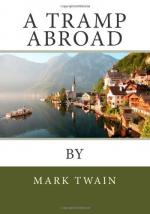For some hours we had been making three and a half or four miles an hour and we were still making that. We had been dancing right along until those men began to shout; then for the next ten minutes it seemed to me that I had never seen a raft go so slowly. When the first blast went off we raised our sun-umbrellas and waited for the result. No harm done; none of the stones fell in the water. Another blast followed, and another and another. Some of the rubbish fell in the water just astern of us.
We ran that whole battery of nine blasts in a row, and it was certainly one of the most exciting and uncomfortable weeks I ever spent, either aship or ashore. Of course we frequently manned the poles and shoved earnestly for a second or so, but every time one of those spurts of dust and debris shot aloft every man dropped his pole and looked up to get the bearings of his share of it. It was very busy times along there for a while. It appeared certain that we must perish, but even that was not the bitterest thought; no, the abjectly unheroic nature of the death—that was the sting—that and the bizarre wording of the resulting obituary: “Shot with A rock, on A raft.” There would be no poetry written about it. None could be written about it. Example:
Not by war’s shock, or war’s shaft,—shot, with a rock, on a raft.
No poet who valued his reputation would touch such a theme as that. I should be distinguished as the only “distinguished dead” who went down to the grave unsonneted, in 1878.
But we escaped, and I have never regretted it. The last blast was peculiarly strong one, and after the small rubbish was done raining around us and we were just going to shake hands over our deliverance, a later and larger stone came down amongst our little group of pedestrians and wrecked an umbrella. It did no other harm, but we took to the water just the same.
It seems that the heavy work in the quarries and the new railway gradings is done mainly by Italians. That was a revelation. We have the notion in our country that Italians never do heavy work at all, but confine themselves to the lighter arts, like organ-grinding, operatic singing, and assassination. We have blundered, that is plain.
All along the river, near every village, we saw little station-houses for the future railway. They were finished and waiting for the rails and business. They were as trim and snug and pretty as they could be. They were always of brick or stone; they were of graceful shape, they had vines and flowers about them already, and around them the grass was bright and green, and showed that it was carefully looked after. They were a decoration to the beautiful landscape, not an offense. Wherever one saw a pile of gravel or a pile of broken stone, it was always heaped as trimly and exactly as a new grave or a stack of cannon-balls; nothing about those stations or along the railroad or the wagon-road was allowed to look shabby or be unornamental. The keeping a country in such beautiful order as Germany exhibits, has a wise practical side to it, too, for it keeps thousands of people in work and bread who would otherwise be idle and mischievous.




